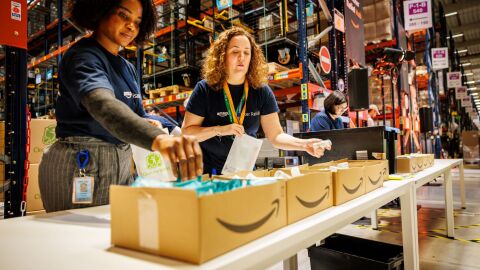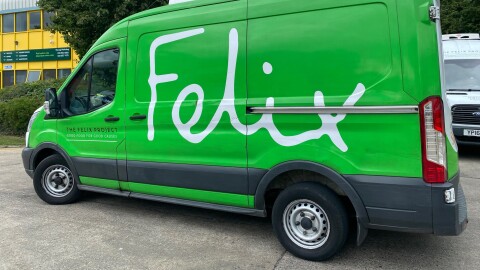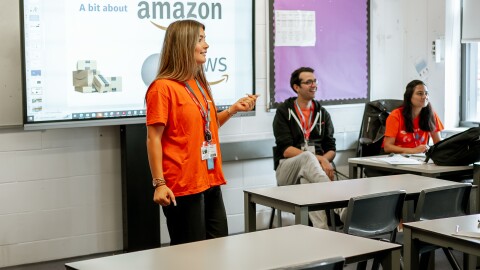The Royal Academy of Engineering and Amazon have announced the first recipients of newly expanded Amazon Future Engineer bursary scheme, launched earlier this year.
Twelve awards, worth £5,000 a year for up to four years, have been granted to women students from low-income households progressing from A Level, Scottish Highers or technical education courses to university education in the 2021/22 academic year.
The awardees will be offered mentoring from Amazon leaders for a minimum of six months to support them at a formative stage in their professional career. The mentors will help students overcome roadblocks while providing invaluable guidance and career advice. Awardees will also be invited to networking and training events at Amazon and the Royal Academy of Engineering, and have access to a community forum providing a peer-to-peer network.
Women are still significantly underrepresented in engineering and technology in higher education. UCAS data on university application and acceptance figures for the 2020 cycle highlighted that women represent just 16% and 18% of accepted applications to computing and engineering degrees respectively. At the current rate of progress, parity of women in engineering degrees will not be achieved until 2085.
Dr Rhys Morgan, Director of Education at the Royal Academy of Engineering, said: “All of these inspirational young women have demonstrated a drive and passion for computing and engineering. They are terrific examples of the talent that exists in schools and colleges across the UK. As they enter careers in engineering, computing and technology, our profession and the communities we serve will be the beneficiaries.”
Lauren Kisser, Director at Amazon’s Development Centre in Cambridge: “Our new Amazon Future Engineer bursary scheme will help more women become the innovation leaders of the UK. More needs to be done to encourage women to enter these fields and break down the barriers which some students face. The Amazon Future Engineer bursary scheme is just one of the ways that we are helping to increase the representation of women in the UK innovation economy and exciting careers in computer science.”
Amazon Future Engineer’s bursary scheme is part of Amazon Future Engineer, our comprehensive childhood-to-career programme to inspire, educate and enable children and young adults from lower-income backgrounds to try computer science and related engineering courses. The bursaries are open to students enrolling onto courses such as electrical and electronic engineering, computer science, artificial intelligence, and software engineering in the UK.
To find out more, we spoke to the bursary recipients about their career ahead and what it means to be supported by Amazon Future Engineer.
Kirsty Balfour, University of Glasgow, Computer Science and Mathematics
Born in Kirkaldy and raised in Dunfermline, Kirsty Balfour has just started her degree in computer science and mathematics at the University of Glasgow.
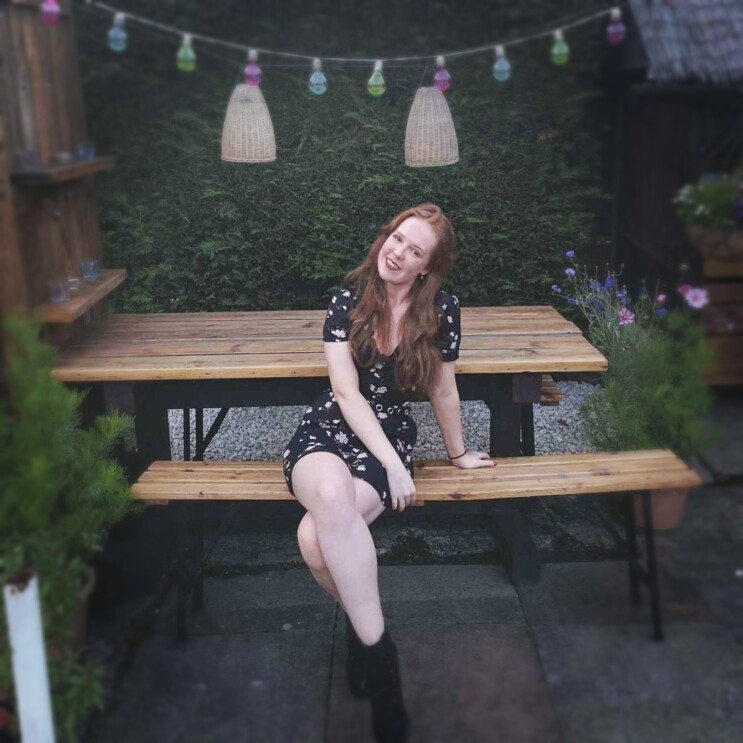
Kirsty excelled at school: she has been a swimmer since the age of five, she took part in Guides, and debating competitions, and was head girl at secondary school. She also took up coding in her spare time, teaching herself Python at 13 years old, and did coding as part of her Duke of Edinburgh Award.
“I loved gaming with my brother as a kid and developed a love for tech as a teenager. Puzzles, problem-solving, logical thinking and maths – it just clicked,” she explains.
Her brother is now a data scientist and Kirsty feels a healthy sibling rivalry motivates them both to make an impact in the technology and innovation sector.
The Amazon Future Engineer bursary means Kirsty is able to move out of home for the first time – leaving a strong friendship group behind, but confident in her ability to grab opportunities to network, learn and grow.
Right now, she’s excited to explore computer science fundamentals like programming, databases, systems, and hardware in depth as part of her first year. In the near future, she’s leaning towards a career in software engineering – but she’s keeping her options open.
“More than anything, I’d love to make an impact by helping other young girls. I want my work to have real meaning, especially as a woman in technology. I know it’s important to meet people, network and make connections, so I’m really excited to get started.”
Finlay Harris, University of Strathclyde, Electronic and Electrical Engineering
Finlay Harris has recently moved from Eastbourne on England’s south coast to the University of Strathclyde in Glasgow, where she is studying electronic and electrical engineering.
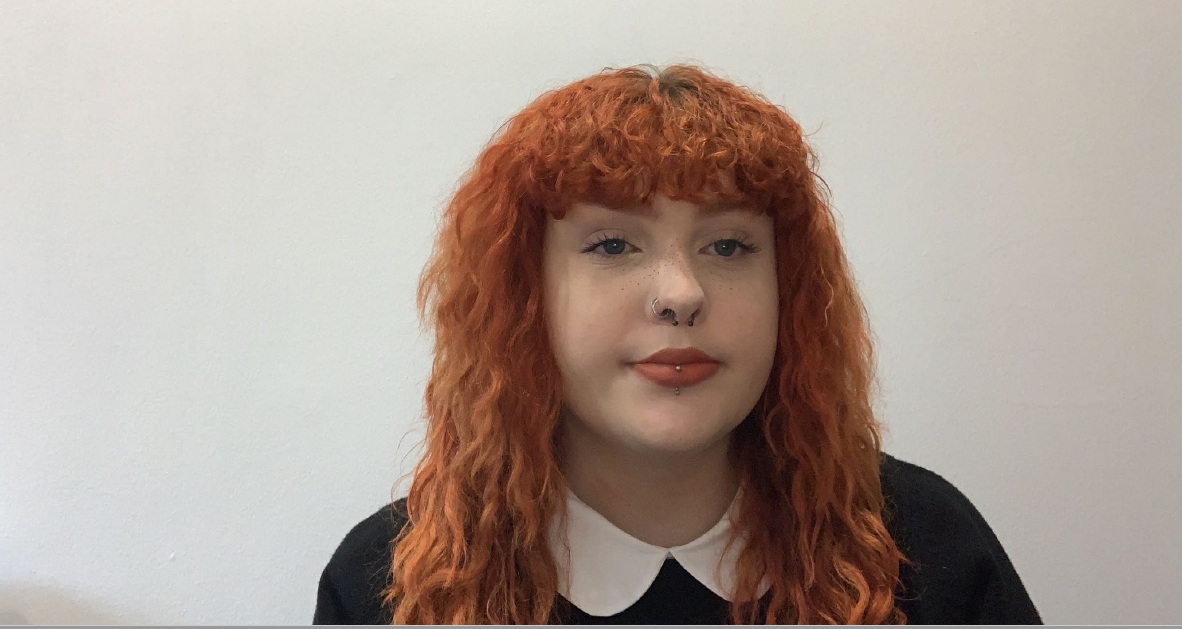
Finlay explains that the course combines her two favourite subjects: physics and computer science. “At college I studied computer science, maths and physics. I always loved physics, it just clicked for me, but as I got older I learned to love maths too!”
Her passion for electronics came about as a child when building gadgets with her grandfather in his garden shed, affectionally dubbed ‘The Electronics Hub’. Her dad works in the solar energy industry, which also sparked a love for renewable energy.
“I would love to work in renewable energy, it’s so important for the future. Right now, my plan is to go into the research side of renewable energy through a master’s and maybe a PhD.”
Finlay found out about the Amazon Future Engineer bursary scheme after her computer science teacher put her forward: “I received the email while I was staying with my friend in Liverpool. I rang my mum and she was running around the house screaming, all I could hear were my dogs barking!”
She has recently kicked off her first year on the course, and so far, she’s enjoying the blend of practical, hands-on work alongside theory, opportunities to network and more. She’s also excited to attend annual meetings with the Royal Academy of Engineering, where she’ll meet and learn from industry leaders.
“I don’t personally know anybody who has studied or worked in the areas I’m most interested in, so networking events made available through the bursary scheme can help to open doors in the future.”
Neve Hoccom, University of Exeter, Computer Science
Growing up in Cornwall, Neve Hoccom knew from an early age what she wanted to do after her talent for programming was spotted by a teacher at the age of 12.
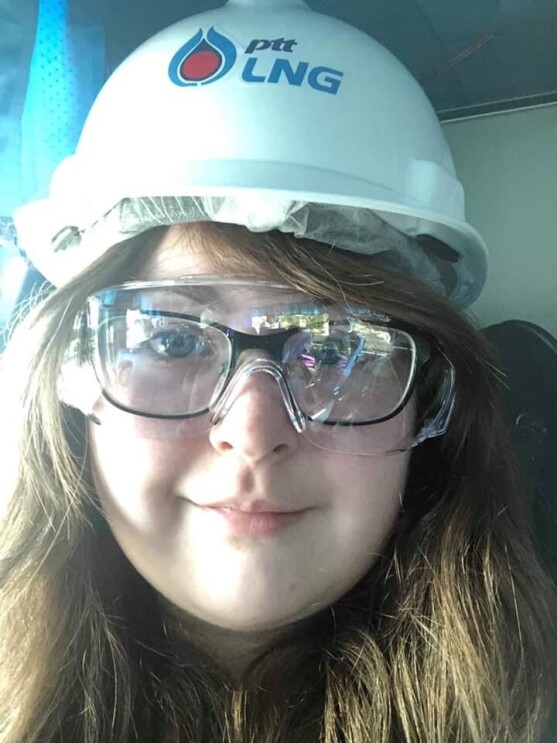
“I was always top of the class in computing,” Neve explains, “so my teacher encouraged me to enter a national cybersecurity competition. I quickly realised that I wanted to specialise in this area, and went on to do a work placement in cybersecurity where I worked on analysis, data and the after-care needed following a cyber-attack.”
Neve’s potential as a future expert in cybersecurity has now been recognised by the Amazon Future Engineer bursary scheme as she begins the first year of a computer science degree at the University of Exeter.
Neve’s passion for cybersecurity is partly inspired by a historical fascination with Second World War codebreakers at Bletchley Park.
“It’s a challenging, fun and unique field – you have to think about what motivates cyber criminals and stay a few steps ahead,” she explains. “My role models are the women who worked in Room 40 in GCHQ during the Second World War. These women codebreakers were not given recognition or acknowledgement of their amazing work, and it’s important to me that representation improves in STEM subjects.”
Neve was delighted to receive the bursary and has big plans: “As soon as I read the email, I shot downstairs to tell my parents and we had a party that evening to celebrate! I’ll use the bursary to earn extra certifications that will broaden my knowledge and expertise of cybersecurity. There are several qualifications with organisations like ICSI and CompTIA that I plan to do in cloud networks, general network security and ethical hacking.”
Eleanor MacCarthy, Goldsmiths, University of London, Creative Computing
Eleanor MacCarthy is a first-year student at Goldsmiths, University of London, where she is combining her love of art and coding.
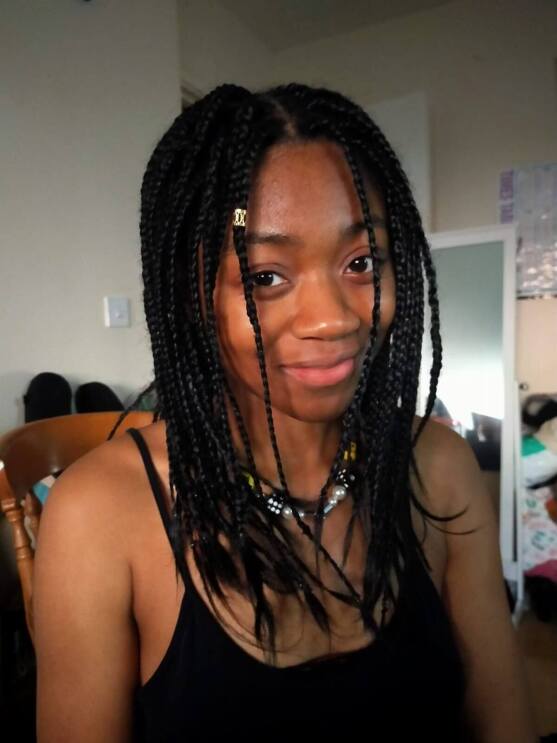
“I’m quite an artistic person, but I also really love the structure that comes with computing,” Eleanor explains. “My ambition is to have a career in technology and innovation, but I also want to start exploring areas that bring art, design and coding together – like animation, computer graphics, gaming, website design and creative industries in general.”
Eleanor has been awarded the Amazon Future Engineer bursary to support her studies, which she says will create many new opportunities for her future career.
“My parents are from Ghana, and I was born and raised in London with my siblings. Along with my brother, we are the first generation in our family to attend university. I always had an interest in technology since I was at school, but I felt discouraged initially as I didn’t have the resources to succeed, like my own laptop.”
Even with those limitations, Eleanor credits the “great support system” provided by her parents as integral to her ambition to get out there and try new things.
“With my parents’ support, in school I took a course in programming and computing. That’s when I fell in love with coding. I even made a website for a client, something I wouldn’t have imagined before!
“I was so excited to hear I won the Amazon Future Engineer bursary. I felt like Amazon recognised my passion despite my limited experience. Most of all, it’s rewarding to know that my potential has real value.
“I’ll use the bursary to attend extra workshops and courses in my spare time to catch up with my peers, and maybe even to help fund creative projects and hobbies.”
Vanessa Neboh, King’s College London, Computer Science
Vanessa Neboh was born in Germany and raised in Greater Manchester from the age of six.
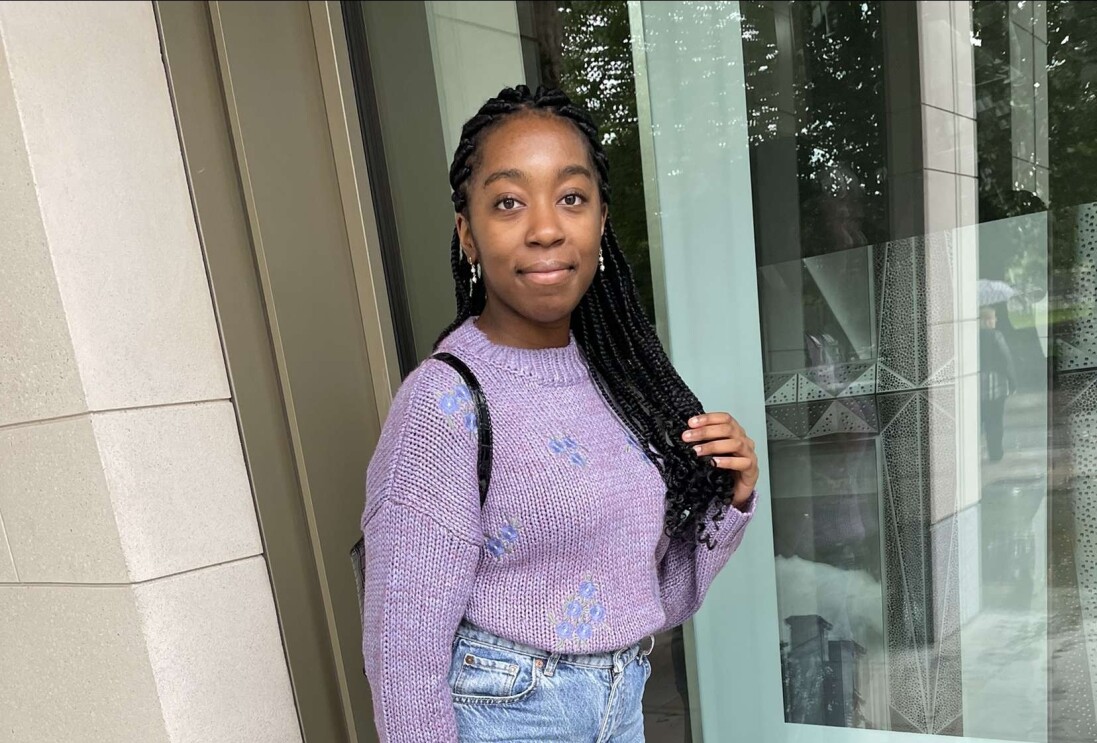
In school she excelled at maths and loved problem-solving, while at home her love for technology was sparked by an informal role as household tech support. “If anything is broken at home, I’m always fixing it,” she explains. “We grew up surrounded by technology and over time I started asking deeper questions – for example, how are apps created and developed?”
Kicking off her degree in computer science at King’s College London, Vanessa is hoping to be challenged by the subject matter with more real-world applications of learning compared to her GCSEs and A levels.
“Coding can be a love–hate relationship: you put your imagination to the test and build cool applications, but you also find a lot of problems and bugs! So having a wider purpose for your work, understanding the real-world application, is an important motivator when things go wrong.”
Vanessa also reflects on the lack of gender equality when studying in school: “There weren’t many girls in my computer science classes and even fewer Black girls like me. Sometimes I was made to feel like an outsider, so I had to be strong-willed and confident. Even at university, I can see the lack of diversity in lecture halls, so I’m committed to changing the game in any way I can.”
She’s inspired by her dad’s work ethic and his consistent message to focus now for long-term rewards in her career: “He always says that you only get one chance in life, so grab the opportunity with both hands. I’m also inspired by women trailblazers like the NASA engineers who were integral to the Moon landing. If they can persevere, I can too!”
Looking ahead, Vanessa wants to work as a programmer full time, improve her coding skills and focus on a lifetime professional development: “I know that learning coding languages through consistent practice, surrounded by peers speaking the same language, and accessing internships will help me translate my studies to the real world.”
Liliana Odjo, University of Warwick, Computer Science
At the University of Warwick, Liliana Odjo has recently started her degree in computer science – thanks to support from the Amazon Future Engineer bursary scheme.
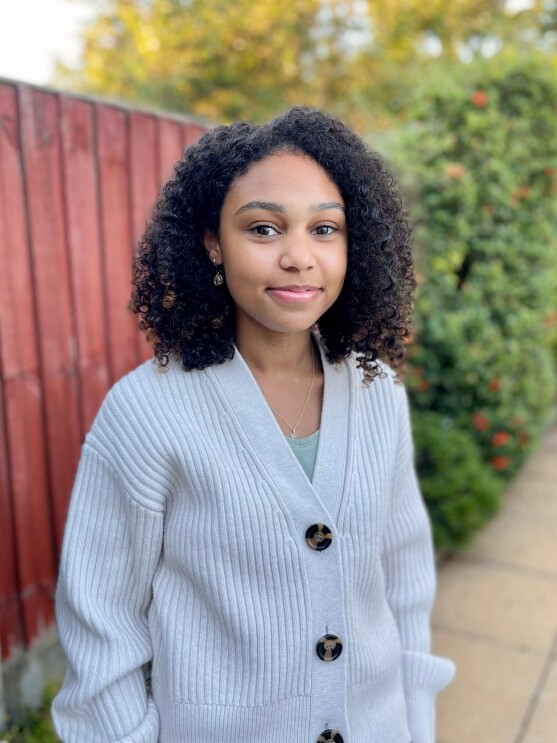
Liliana was first introduced to coding at a young age through a primary school computer programme called Scratch, when she discovered her passion for computer science: “I used to spend all my school breaks playing with Scratch, for years and years, while other kids were out playing in the playground. It completely captivated me and definitely inspired me to study computer science.”
However, Liliana nearly fell out of love with computing as a teenager, feeling limited by her school experiences: “I came to believe that coding was more like a hobby to fiddle with in my spare time, rather than a potential career. I found the GCSE computer science courses uninspiring. I was hungry for real-world exposure experience and impactful industry knowledge.”
But her passion has shone through, inspired by global events like the Mars 2020 Perseverance Rover and the NHS data collection programmes during the COVID-19 crisis. “Those special moments of scientific discovery and real-world impact have helped me realise that I can make a real impact in the world around me if I follow my passion.”
Liliana was encouraged to apply for the Amazon Future Engineer bursary scheme by her physics teacher and never looked back: “At the time I was accepted on to the programme, I was feeling really low in the job I was doing, it felt like a dead end. When that email came through, I knew that good things happen when you push yourself higher.”
She feels the bursary will open doors in her university career, work experience, internships, and beyond. “It means a lot to know that I’m getting closer to the world of work. Gathering industry contacts and networking with specialists is really important to me – I simply would not have those opportunities without attending university.
Sadia Wahid – Imperial College London, Computing (International Programme of Study)
Sadia Wahid has lived around Tower Hamlets in East London her entire life, with her parents coming from Bangladesh.
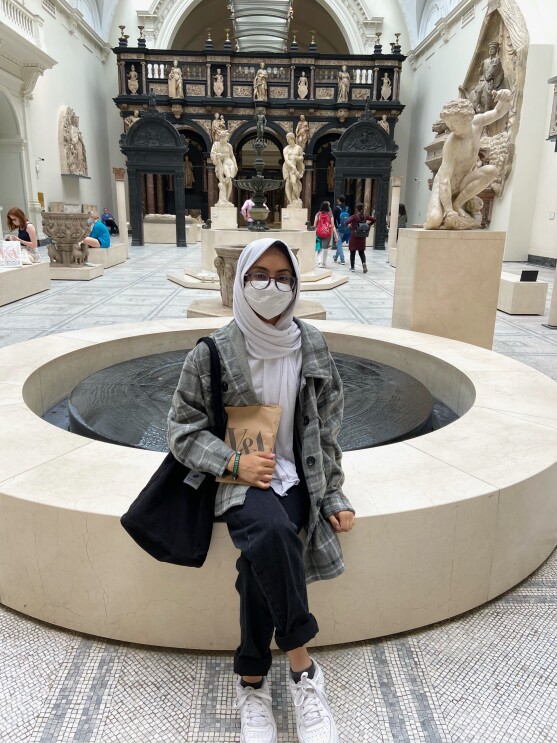
Her degree at Imperial College London, computing (International Programme of Study), is a four-year course with an integrated master’s and an international placement in Europe or the US.
In school, she signed up to “all the clubs” including an engineering scheme with an industry placement for two weeks, which played an important role in her degree choice: “Seeing how a civil engineering business works, being part of a major construction project, seeing the environment, working culture and engineering all come together – that was a turning point for me.”
She’s also inspired by her grandfather, who has always been “busy and ambitious, making new opportunities for our family. Even today he still knits, sews, cooks, and cleans!”
Sadia is also a talented visual artist and is passionate about the environment, technology and art coming together: “In computer games, for example, I love the creativity behind virtual environments that look and feel real. I also want to build aspects of my Bangladeshi heritage into my art, so other people can experience and understand my culture.
"Computing and creativity are much closer than people realise – a technology career can be full of creativity! I want to help other people understand this more,” she adds.
The Amazon Future Engineer bursary scheme means Sadia can move out of home for the first time and have her own space to study. The funding will also help to cover her tuition fees, books, and other equipment, as well as day-to-day living costs.
“I live in a crowded home, so my own space to study feels like a privilege. I would advise others to always look for funding opportunities – university can be accessible, your background or start in life doesn’t have to hold you back!”
Find out more about Amazon Future Engineer.






